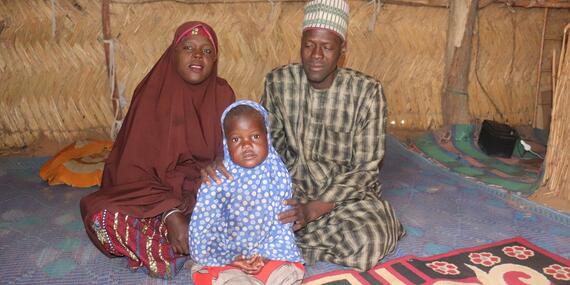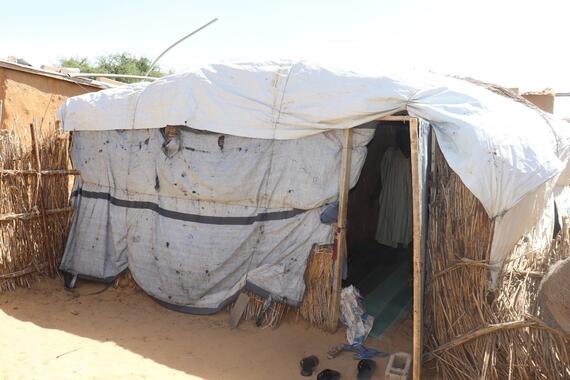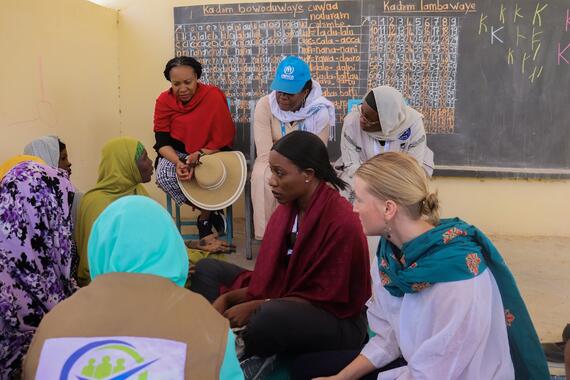Niger: Helping people to help themselves

By Abdoulaye Boubacar Hamani
Mamadou Brem lives in the Boudouri site for displaced people, in Niger’s Diffa Region. He prefers not to rely heavily on humanitarian aid, and he appreciates the unique approach of the OCHA Flagship Initiative: allowing communities to decide their priorities, which will determine the humanitarian assistance they receive.
Launched in 2023, the Flagship Initiative aims to transform OCHA and the global humanitarian system into an efficient, cost-effective service that is driven and led by the priorities of affected people and communities. Niger is one of the four countries where the initiative is being piloted.
Mamadou cites a Kanuri proverb to illustrate the necessity of letting communities decide what they want: “He who needs a needle but is given a sword has not resolved his issue.”
Mamadou and his family of 15 were relocated to the Boudouri site in 2016, along with people from eight villages in the region, following attacks by armed groups.
He explains: "Before the crisis I was a trader and could meet my family’s needs. But since we have been here, we owe our survival to humanitarian aid."

However, aid is becoming scarce due to a lack of funding, while needs are increasing. On 31 December 2023, only 43.7 per cent of the funds required for the 2023 Humanitarian Response Plan for Niger had been received.
Despite a relative calm in the security situation, the humanitarian situation remains precarious. The region is facing staggering levels of food insecurity, with four out of six communes having recorded poor harvests.
About 19 per cent or more than 160,000 people of the region's total population of 850,699 people were in crisis and emergency phases (eating just one meal a day) during the 2023 post-harvest period. This could rise to 25 per cent of the region’s total population during this year’s lean season (June–August 2024).
The Diffa region also suffers from the detrimental effects of climate change, and many households are still recovering from successive floods. The Boudouri site is no exception. Located 15 km from the town of Diffa, in the south of the rural commune of Chétimari, the site is home to 1,300 displaced households who fled their villages because of attacks by non-State armed groups in the region, but also because of recurrent flooding.
Becoming self-sufficient
Despite all this, Mamadou is using his skills to grow food during the off season and increase his self-sufficiency.
He explains: "I produce rice on a plot of land that I lease and pay with three bags of rice at harvest. Now I have enough to eat. Last year I produced millet for my family's consumption, and this year, because of the effects of climate change, I've grown peanuts."
Mamadou also sells the rice straw from his crop, which is used for livestock feed: "I have placed it on the market to make a bit of money and be able to buy fuel and fertilizer, which I use to grow onions as well. A portion of the money also contributes to baptism and wedding ceremonies in the community. This is done out of solidarity and promotes social cohesion."
Mamadou received assistance from the Support Project for Refugees and Host Communities, funded by the World Bank, which later enabled him to buy land to farm during the off season.
People want to build skills
Earlier this year, Edem Wosornu, Director of OCHA’s Operations and Advocacy Division, met with people at the Boudouri site.

During these discussions, women requested assistance to engage in income-generating activities; men requested fertilizer, motor pumps and fuel to produce food through vegetable gardening; and young people spoke about accessing employment opportunities.
Education is a major challenge in this region, and 24 schools are still closed due to violence. Following a visit to a primary school at the site, Wosornu said: “My wish is that all these children can one day return to their homes."
It is crucial to maintain the Flagship Initiative to help people become self-reliant and resilient as the crisis deepens making people even more vulnerable. As the conflict intensifies, it has become more difficult to provide humanitarian aid. Besides the conflict, people are also dealing with a combination of high inflation, deepening poverty and high food prices. The Initiative’s interactions led by OCHA with the representatives of communities in the Diffa Region contributed to a better understanding of how to increase community engagement in sparsely populated areas affected by insecurity, and how to consult and communicate with people based on their preferences.
Efforts also continue to strengthen the participation of local and national actors in all aspects of the response, including planning, coordination and decision-making, with the support of the Regional Humanitarian Fund for West and Central Africa.
Wosornu added: "The groups of women I met during my visit were full of hope for the future and worked side by side with the host communities, refugees and internally displaced persons to cultivate the land. They work hard together to improve their living conditions. Humanitarian actors and the international community at large must mobilize vital aid but also find ways to promote opportunities so that people can take care of themselves and their families."
